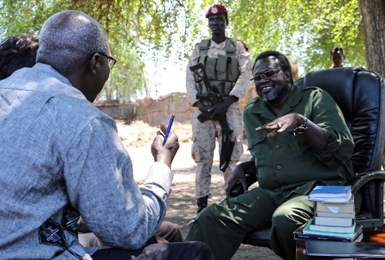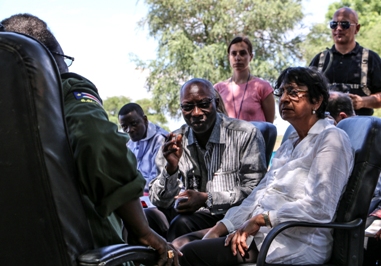Top UN officials meet rebel leader Machar at secret location
April 29, 2014 (JUBA) – The UN high commissioner for human rights, Navi Pillay, met with South Sudan’s former vice-president turned rebel leader Riek Machar at an undisclosed location on Tuesday following the recent wave of ethnic violence in the country.

Pillay confirmed the meeting with Machar following her return to the capital, Juba.
She said discussions during the 35-minute meeting, which took place under a tree in a village, had centred on recent violence in Unity state capital Bentiu in which civilians were reportedly massacred by Machar’s rebel forces after they retook the strategic town from government troops loyal to Kiir.
“[We] gave him the concerns of the secretary-general [Ban Ki-Moon] about protection of civilians,” she said. “We received assurances from him that he himself is investigating human rights violations that occurred in Bentiu and is also concerned about the protection of civilians here.”
The human rights chief said that Machar had conceded he “found it difficult to be in the situation where he is”, also noting that a stack of books in front of Machar during the meeting included one about a failed state.
“I welcome the fact that he is thinking in terms of a political solution to the problem,” she said. “He wants to be assured that the president of South Sudan will keep to his word and then they could resume the cessation of hostilities agreement,” she added.
ETHNIC ATTACKS
Dieng, who also accompanied Pillay to meet displaced people at the UNMISS base in the Jonglei state capital Bor, said it was extremely shocking to see how traumatised most of them were.
Dozens of civilians died after the base was attacked by an armed pro-government mob, reportedly angered by celebrations inside marking the fall of Bentiu.
More than 200 civilians were reportedly killed and over 400 wounded at a local mosque after Machar-aligned rebels took control of Bentiu from government forces last week.
The UN claims that rebels deliberately targeted civilians, who had taken shelter at the mosque, based on their ethnicity and nationality.
It has also alleged hate messages were broadcast on the radio after the town’s capture inciting violence and rape.

MACHAR WARNED
Dieng said Machar had been warned of the consequences of human rights abuses by his troops in the field.
“We did drew the attention of Dr Machar that we hope that he will really call to order his commanders in the field, those who are overseeing attacks,” he said. “We made it very clear that it is important to remember that in most of the armed conflict in Africa those who did not listen to the call to cease hostilities to bring peace ended before the courts.”
Dieng said his comments referenced the threat of prosecution in the International Criminal Court (ICC) and that he had specifically cited the cases of former Liberian former president Charles Taylor and Sierra Leonean warlord Foday Sankoh during the discussions.
“I mentioned to him that accountability be addressed,” said Dieng. “He did mention that he is investigating his own people, but at the end of the day what is critical is that the hostilities have to be ceased and that both leaders come together so that the people of … South Sudan won’t be betrayed,” he added.
Dieng said the UN Mission in South Sudan’s (UNMISS) decision to open its gates to civilians seeking protection was a first in its history and had been pivotal in preventing South Sudan suffering a repeat of the Rwandan genocide which occurred 20 years ago.
Pillay and Dieng arrived in Juba on Monday amid growing international concern about a wave of atrocities committed by both rebels and government forces since political tensions between Kiir and Machar erupted in Violence in mid-December.
The high level visit coincides with the resumption of peace talks between the warring parties in Ethiopian capital Addis Ababa. Progress has so far been slow, with a ceasefire agreement signed on 23 January failing to stem the violence.
The violence, which has also stoked ethnic tensions in the country, has killed thousands of people and more displaced more than a million, many of whom have taken refuge at UNMISS bases or fled to neighbouring countries.
CALLS FOR ONE MONTH OF CALM
Meanwhile, Toby Lanzer, who heads UN humanitarian efforts in South Sudan, has called on all parties to the conflict to observe a month of tranquillity this May to ensure a safe environment for civilians.
Speaking on behalf of Lanzer at a press briefing in New York on Tuesday, UN spokesman Stephane Dujarric said a ceasefire “would enable people to be safer and move freely, without fear of violence” while carrying out their daily activities, including cultivating crops and tending their livestock.
It would also help guarantee a safe passage for those wishing to travel to other countries.
“Lanzer also said that while the only way to reverse this crisis and its grave humanitarian consequences is to find a political resolution to the conflict, he added that one month of tranquillity this May is a tangible step that will have an immediate impact on the lives of millions of people,” said Dujarric.
The more than four-month-old conflict has put 7 million people at risk of food insecurity across the country, the world body says.
(ST)
